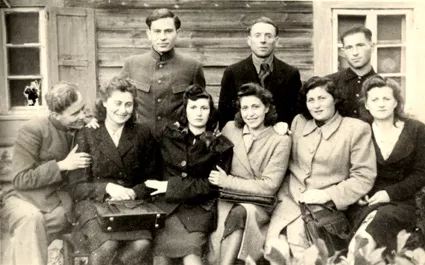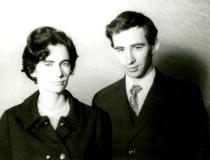This picture was taken upon my return from the concentration camp, in Jurbarkas by our house in 1946. My husband is standing first from the left, then our friends Leizer and Bobke. They died in the 1980s. I am sitting first from the left. I don’t remember the rest. Almost all Jurbarkas Jews, who survived the war, got together in this picture.
In July 1945 Aunt Leya and I came to Kaunas. First we were given a place in a dormitory. Several people lived in one room. In a couple of days we met our friend from the camp – I can’t recall her name – and she took us with her. People who had to go through the camps found their property precious, they valued human life and tried to assist each other the best way they could. That lady had two rooms and she gave one to us. Leya found a job. She was waiting for her husband to come back from the front. It turned out that Yakov was alive. We got our documents. My name was misspelt – not Doba, but Dobre. I decided: let that kind name stay [Editor’s note: ‘dobre’ means ‘good’ in Ukrainian]. Since that time I am Dobre in my documents. At home I was called Dobele, the way I was called in my childhood.
I was yearning to go back to my native town and in a while my aunt took me to Jurbarkas. Our house wasn’t destroyed, but it was occupied by Lithuanians, and we had to wait for it to be vacated. I was sheltered by our neighbor Abu Fales. He was married. He and his family, his wife Chiena and their children, remained in the occupation. His loved ones perished, but Abu was miraculously rescued by local Lithuanians. Abu treated me like his own daughter. I stayed with him for a couple of months and could stay there as if I was his daughter. He married for the second time. His second wife was Miriam. She also lost her family. They suggested adopting me. I was seventeen. I loved and remembered my parents, and couldn’t betray the memory of them. I understood that I had to start a new adult life.
All happened almost at once. The house was vacated and I was summoned to the municipal ispolkom and given the permission to live in our house. I still wonder why they didn’t accommodate anyone with me as the house was large. At that time the son of my parents’ good friends, Sholom Ruvim Rozenbergas, came back from the lines. I had known him very well before the war, but since he was five years older than me, I never used to have common interests with him, as there was quite a big gap between us in my childhood. Now, as the two of us were lonely, we were attracted to each other. First, we had recollections that bound us, then we fell in love with each other. In the middle of 1946 we got our marriage registered at the regional marriage register. Of course, both of us wanted to be wed under a chuppah, but there was neither a synagogue nor a rabbi in Jurbarkas. During the occupation Fascists made Jews destroy the synagogue with their own hands, stone by stone, and then they shot them on that place.























